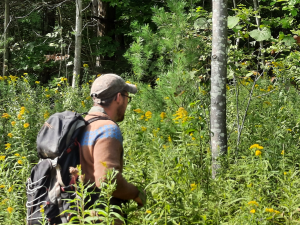Introduction
 Welcome to our introductory guide on nature connection for academic instructors, designed to inspire and support educators in integrating approaches to reconnecting with land and place into their teaching practices. This eBook is not just a resource but a journey—a collaborative effort rooted in a deep desire to further understand the profound benefits of learning with the living world while recognizing the colonial contexts our institutions operation within.
Welcome to our introductory guide on nature connection for academic instructors, designed to inspire and support educators in integrating approaches to reconnecting with land and place into their teaching practices. This eBook is not just a resource but a journey—a collaborative effort rooted in a deep desire to further understand the profound benefits of learning with the living world while recognizing the colonial contexts our institutions operation within.
“You can’t know who you are until you know where you are” – Wendell Berry
In today’s educational landscape, it is crucial to recognize and address the historical and ongoing impacts of colonization. By embracing principles and approaches of nature-based learning, we can foster a more inclusive, respectful, and holistic approach to education. This guide underscores the dual purpose of acknowledging the cultural histories of learning on land and the potential harms in our work, while also highlighting the extensive benefits of incorporating these practices. Young people uniquely experience the mental and emotional dimensions of climate change and evidence increasingly illustrates that young people are particularly vulnerable to climate distress and anxiety (Galway & Field, 2023). Research that we explore has shown that incorporating nature connection enhances student engagement, promotes environmental responsibility, and nurtures a sense of community and belonging. Connection to the living world is crucial to physical, mental, social, and spiritual wellness for all people.
The conception of this eBook was driven by a shared vision and input from a number of collaborators over the past two years: byron murray, Dani Hagel, Nikola Barsoum, Jennifer Chesnut, and Ben Muller. The contributors come from a variety of cultural backgrounds including multi-generation settler Canadian, Indigenous, and first-generation immigrant Canadian. Through collaboration, extensive research, and a series of insightful interviews, we gathered and synthesized information to extract examples of and insights on inspirational practices. The goal of this eBook is to provide an educational, practical, and evidence-based resource for use in post-secondary courses. In an educational era that is heavily embedded in technological development, we hope to refresh both student and educator perspectives by focusing some of our learning outdoors. By delving into these practices, you will find actionable strategies and reflections that can help you integrate nature connection into your curriculum. This guide is designed to be a flexible and adaptable tool, suitable for a variety of educational settings. Amongst those involved in the development of this book alone, nature connection was applied in social work, urban planning, sustainability education, filmmaking, and occupational therapy. As you navigate through this eBook, we hope you find it to be a valuable companion in your teaching journey. Whether you are just beginning to explore the concept of nature connection or are looking to deepen your existing practice, this guide aims to support you in creating meaningful, transformative educational experiences that reconnect learners with the living world and their place within it.
As you explore our resources and materials, please do so in an approach that best meets your interests and needs! The first half of our book primarily focuses on conceptual backgrounds and descriptions of the topics related to nature connection education, while the second half highlights experiences of educators practicing nature connection, activity guides, and practical steps to applying nature connection into your curriculum in post-secondary contexts.

Feedback/Errata